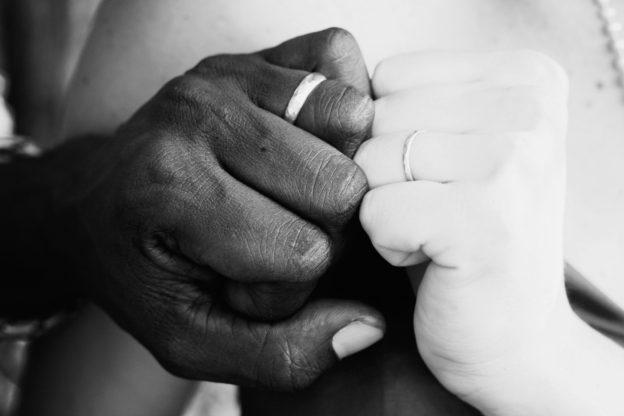by Elisabeth Barahona
Marriage is a mysterious journey of learning how to consent to God in order to learn how to say “yes” to one’s spouse. It is a delicate interdependence of honoring both the I and the we in this journey towards marital togetherness. Archbishop Desmond Tutu provides a powerful framework called Ubuntu that encapsulates how the individual and the community cannot be divorced. In short, Ubuntu is “I am because we are.”
The difficulty of marriage cannot be underestimated. The first years of our marriage forced us to examine painful and ugly parts of ourselves. We decided that one thing we would always strive for is to be honest with ourselves first prior to compromising on a given issue. Ten years in, we are still figuring out how to live into that. We have learned that when we begin to feel anger or resentment towards each other, it is a sign that our individual voices have already been muted. We have to spend time hearing our own voice before we can offer it to anyone else. That is our individual responsibility; no one can do this for us. I am learning that there is room for the Ubuntu phrase to also become inverted, We are only if I am.
How can we honor the I in we? Contemplative Christian practices offer us a model. These practices (centering prayer, breath prayer, lectio divina) teach us to listen instead of talk. Prayer becomes communion, rather than just one-way communication. Submitting ourselves to this Divine presence requires us to show up and to consent to God’s movement. I am not in charge. I am not in control. I am not the one changing or illuminating. Although a limited analogy, it is as if I am a cell phone showing up to be connected to the power source. I am doing the work of showing up to prayer, but I relinquish the power and control to the one who is doing the charging. I am showing up to wait on the Lord to illuminate and change me.
When we wait on the Lord to show up to us, we encounter a God that has always offered this remarkable story of Love. Contemplative prayer allows us to cultivate the tools through silence, solitude and stillness to tune into the Divine. This invitation has always been extended, we are just learning to accept the invitation. This invitation is not new, it’s just newly available to us because we are learning to finally listen. Learning to listen to God’s voice is, in fact, learning how to listen to our own voice. And listening to our own voice is learning to listen to God’s voice. I am because we are. We are because I am. When our vertical relationship with God is strengthened, our horizontal relationship in marriage is equally strengthened.
Contemplative practices are offering me a model for communion with God that first allows me to find my own voice in this Divine story of Love. I cannot know my voice apart from God’s. Our job is to show up. God’s job is to do the rest. Then, only then, can we truly show up to our marriage with our voice that is now grounded in the I and the Divine we. We have expanded the circle of love into three way communion.
I am because we are. We are because I am. Marriage is a mysterious journey of consenting to the Divine first, which in turn fuels the “yes” to our marital union. Marriage is a painful and amazing process of learning to expand our internal and external circles of love. Expand the circle from I to we. We were never meant to do this life alone. It teaches us about the fullness of what love can be. The circle is much bigger than we can imagine.
 Elisabeth Barahona considers herself rich because she has the privilege of sharing her life with her amazing husband and three children. Professionally, she is a Licensed clinical social worker at Maple City Health Care Center in Goshen, IN. She is an artist, beauty-seeker, life-learner, justice-pursuer and ever on a quest for her soul.
Elisabeth Barahona considers herself rich because she has the privilege of sharing her life with her amazing husband and three children. Professionally, she is a Licensed clinical social worker at Maple City Health Care Center in Goshen, IN. She is an artist, beauty-seeker, life-learner, justice-pursuer and ever on a quest for her soul.
This piece originally appeared on Menno Snapshots, the official blog for Mennonite Church USA
